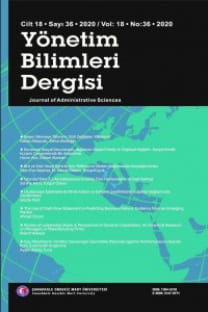Applications of financial reporting in the European Union and Italy
Avrupa Birliği (AB), yönergeler vasıtasıyla Uluslararası Muhasebe ve Finansal Raporlama Standartları (UMS/UFRS) ile uyumlaştırmayı başarmış, bunu özellikle dördüncü ve yedinci Avrupa Komisyonu (EC) yönergelerinin uygulanmasıyla gerçekleştirmiştir. Dördüncü ve Yedinci yönergeler, AB içinde muhasebenin uluslararası boyutlara taşınması ve uyumlaştırmasında kullanılan en önemli araçlardır. Avrupa Birliği, borsada işlem gören şirketler için Uluslararası Muhasebe Standartları Kurulu’nun Uluslararası Finansal Raporlama Standartları (UFRS) ve Uluslararası Muhasebe Standartlarından (UMS) uygulanabilir olanlarını onaylayıp yürürlüğe sokmaktadır. Bu çalışmanın amacı ise, UMS/UFRS’lerin Avrupa Birliği’nde ve İtalya’da uygulanma sürecini incelemek ve finansal raporlamaya etkisini genel olarak göstermektir.
Avrupa Birliği ve İtalya’da finansal raporlama uygulamaları
The European Union (EU) achieves the objectives of harmonization of International Accounting and Financial Reporting Standards (IAS/IFRS) through the Directives, mainly the Fourth and the Seventh of the European Commission (EC) Directives. The Fourth and the Seventh Directives are the most important instruments which are used to promote accounting internationalization and harmonization within the EU. The EU is the largest jurisdiction body and approves and puts into effect only applicable financial reporting rules for listed companies under the IASB’s International Financial Reporting Standards and International Accounting Standards. The purpose of this study is to examine implementation process and show general effect of financial reporting of the IAS/IFRS's in the European Union and Italy.
___
- ARMSTRONG, Christopher, BARTH, Mary E., JAGOLINZER, Alan and RIEDL, Edward J., “Market Reaction to Events Surrounding the Adoption of IFRS in Europe” http://www.hbs.edu/units/am/pdf/Riedl.pdf (Accessed on July 15, 2008)
- BEBBINGTON, Joseph and SONG, Esther, “The Adoption of IFRS in the EU and New Zealand” http://www.europe.canterbury.ac.nz/research/ pdf/finance_nz_prelim_report.pdf (Accessed on July 14, 2008)
- BRACKNEY, K. and WITMER, P., “The European Union’s Role in International Standards Setting” The CPA Journal, November 2005, http://www.cpajournal.com (Accessed on August 06, 2008)
- FRANCHI, Franco, “Italian Regulatory Context”, (May 26-June 16, 2008), Rome, 2008a
- FRANCHI, Franco, “Transition to IAS/IFRS in Italy”, (May 26-June 16, 2008), Rome, 2008b
- LEBLOND, Patrick, “The International Harmonization of Accounting Standards in The EU”, Paper Presented At The Annual Meeting Of The American Political Science Association, September 2005, http://www.allacademic.com/meta/p40567_index.html Washington, (Accessed on August 01, 2008)
- MALTHUS, Sue, “International Convergence of Financial Reporting Standards” Working Paper Series No. 1/2004, Nelson Marlborough Institute Of Technology, http://www.nmit.ac.nz/_Community/Documents/11711/InternationalConverg enceOfFinancialReportingStandardsMalthus104.pdf, April 2004, New Zeland (Accessed on August 08, 2008)
- MIRZA Abbas Ali, HOLT, Graham J. and ORREL, Magnus, IFRS: Workbook and Guide, USA: John Wiley & Son Inc. 2006
- PILI, Alesandro, “The Adoption Of A Comprehensive Income Statement In Italy: Has The Time Of A New Disclosure Come?”, http://www.ssrn.com (Accessed on July 20, 2008), Italy.
- POZZOLI, Matteo “Financial Reporting: Main Aspects of the Italian Corporate Law”, (May 26-June 16, 2008), Rome.
- EFRAG, The European Financial Reporting Advisory Group, http://www.efrag.org
- IASB, International Accounting Standards Board, http://www.iasb.org
- OIC, Organismo Italiano di Contabilita, http://www.oic.org
- ISSN: 1304-5318
- Başlangıç: 2003
- Yayıncı: Yönetim Bilimleri Dergisi
Sayıdaki Diğer Makaleler
Applications of financial reporting in the European Union and Italy
Türkiye’de Siyasi Partilerin Küresel Çevre Sorunlarına Yaklaşımları
Avrupa Siyasi Partilerinin “Avrupalılaşması”
AVRUPA BİRLİĞİ VE İTALYA’DA FİNANSAL RAPORLAMA UYGULAMALARI
Gönüllülük ve yerel hizmetlere gönüllü katılım üzerine açıklamalar
2008 Global Ekonomik Kriz’in Genç İşsizlik Açısından Değerlendirilmesi
